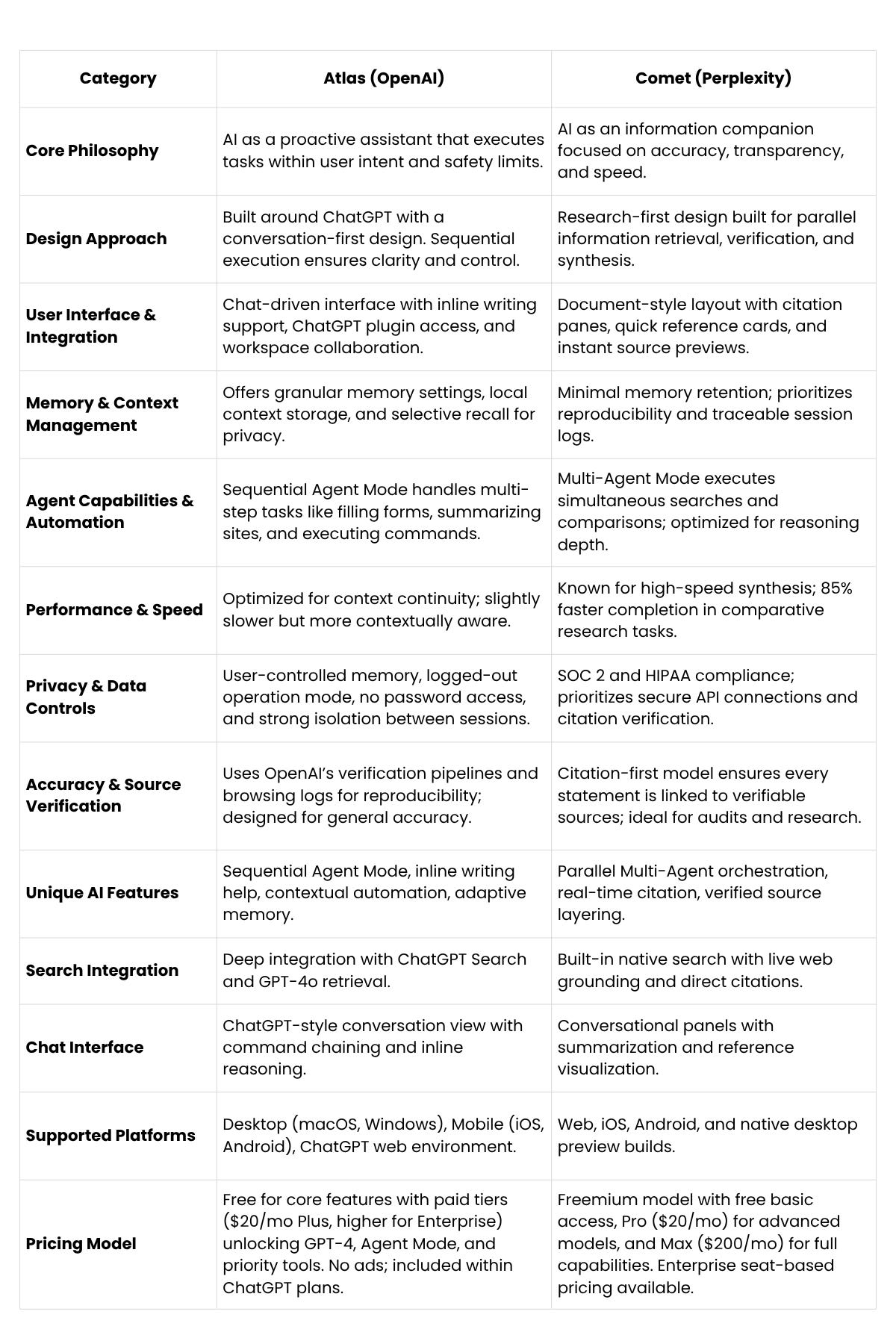The Third Browser War - Atlas vs Comet
Explore how OpenAI's Atlas and Perplexity's Comet are redefining web browsing in 2025’s AI browser war
Something interesting is happening in the world of browsers. For the first time in decades, the default experience of how we interact with the web is being reimagined. The launch of OpenAI’s Atlas and Perplexity’s Comet signals a new phase-what many are calling the third browser war. The first battle was Netscape vs Internet Explorer. The second was Google Chrome’s rise and domination. And now, the third is shaping up around AI-powered browsers that don’t just show you the internet-they think alongside you.
2025: What Happened with Comet and Atlas
2025 marked the start of the so-called third browser war, with OpenAI and Perplexity taking AI browsing mainstream. Here’s how the year unfolded:
Early 2025: News spread that OpenAI was building an AI-native browser under the codename Atlas, led by Ben Goodger (ex-Chrome). Development was based on Chromium and tightly linked with ChatGPT.
May: Perplexity CEO Aravind Srinivas shared his vision of building an “operating system for everything.” The company’s ambition was clear: own the default browser experience.
July 8–9: Perplexity launched Comet as a limited release for Max subscribers ($200/month). The waitlist exploded, and users started calling it the “most wanted AI product of the year.” The same week, media confirmed OpenAI’s plans for Atlas, sparking industry-wide speculation.
August: Perplexity expanded Comet’s beta and fixed a security flaw reported by Brave. Later that month, it launched Comet Plus ($5/month), giving access to premium content from publishers like CNN, Fortune, and The Washington Post, sharing 80% of revenue with them.
October 2: Comet went free worldwide on Mac and Windows, removing the paywall. Two weeks later, Enterprise tiers were added ($40 and $325 per seat), complete with SOC 2 and HIPAA compliance.
October 21: OpenAI officially launched ChatGPT Atlas globally. It was free for all ChatGPT users, with macOS available immediately and other platforms coming soon. Features included Agent Mode (for Plus/Pro users), inline writing help, and a persistent chat sidebar.
October 22: Industry analysts formally declared the start of the third browser war. Alphabet’s stock dropped 4.8% following the announcement, and Google accelerated Gemini integration into Chrome.
By the end of the year, both browsers had defined their territory: Comet led on speed, verification, and enterprise readiness, while Atlas focused on privacy, integration, and conversational control. The battle for the “front door to the internet” had officially begun.
Comet vs Atlas: Feature Comparison
Use Case Optimization
Atlas
Ideal for multi-step automation and document drafting, where Agent Mode executes clear, supervised workflows.
Excels in privacy-sensitive environments with granular memory settings and logged-out agent operation.
Supports complex reasoning tasks such as structured problem-solving and multi-step planning.
Integrates seamlessly with ChatGPT Teams for collaborative content creation and workflow automation.
Comet
The preferred choice for research and analysis, with citation-first synthesis and verified sources.
Designed for speed-critical operations, using parallel agents for rapid data retrieval and completion.
Trusted by enterprise research teams needing SOC 2/HIPAA compliance and traceable collaboration.
Delivers real-time information synthesis through live web grounding and accuracy-first retrieval.
Final Words
Neither Atlas nor Comet is ready to dethrone Chrome yet. They’re early, ambitious, and still finding their place. But they represent something bigger: a shift from passive browsing to active collaboration.
Atlas is the better fit for users who want seamless automation, conversational help, and privacy-conscious task execution. Its sequential agent mode and memory controls make it the natural choice for those who prefer proactive assistance with clear safety lines.
Comet, on the other hand, shines for those who care about speed, verification, and trust. Its citation-first design, multi-agent reasoning, and transparency ethos make it perfect for research-intensive workflows.
Both are glimpses of the next era of the web-where browsers stop being windows and start becoming partners.




